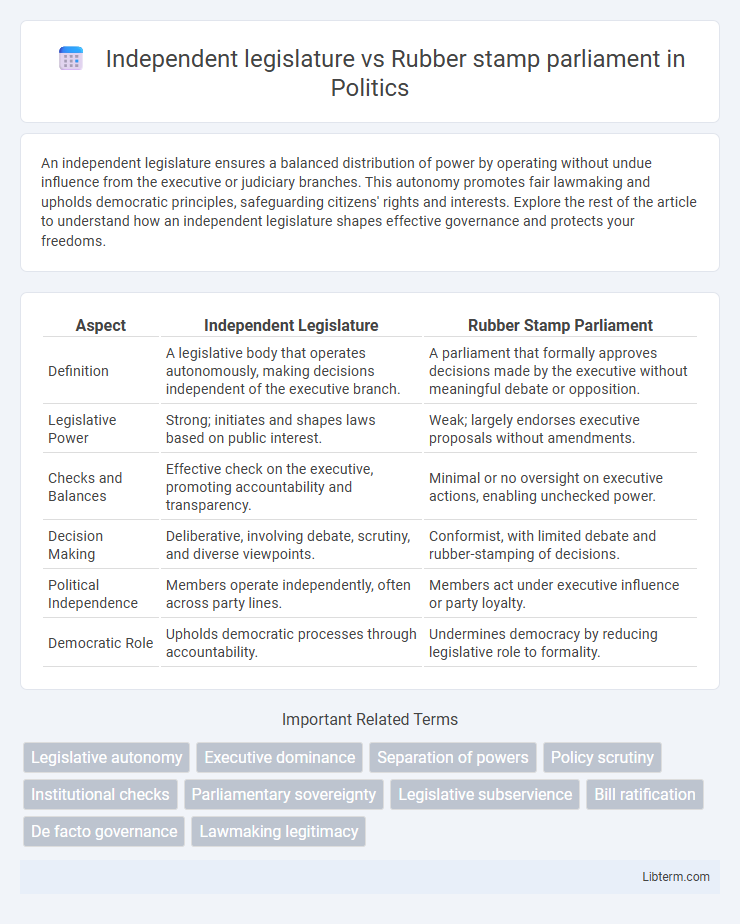An independent legislature ensures a balanced distribution of power by operating without undue influence from the executive or judiciary branches. This autonomy promotes fair lawmaking and upholds democratic principles, safeguarding citizens' rights and interests. Explore the rest of the article to understand how an independent legislature shapes effective governance and protects your freedoms.
Table of Comparison
| Aspect | Independent Legislature | Rubber Stamp Parliament |
|---|---|---|
| Definition | A legislative body that operates autonomously, making decisions independent of the executive branch. | A parliament that formally approves decisions made by the executive without meaningful debate or opposition. |
| Legislative Power | Strong; initiates and shapes laws based on public interest. | Weak; largely endorses executive proposals without amendments. |
| Checks and Balances | Effective check on the executive, promoting accountability and transparency. | Minimal or no oversight on executive actions, enabling unchecked power. |
| Decision Making | Deliberative, involving debate, scrutiny, and diverse viewpoints. | Conformist, with limited debate and rubber-stamping of decisions. |
| Political Independence | Members operate independently, often across party lines. | Members act under executive influence or party loyalty. |
| Democratic Role | Upholds democratic processes through accountability. | Undermines democracy by reducing legislative role to formality. |
Understanding the Independent Legislature Concept
The Independent Legislature concept emphasizes a legislative body free from executive influence, empowered to make and enforce laws autonomously, ensuring checks and balances within a democratic system. This contrasts sharply with a Rubber Stamp Parliament, which merely approves decisions made by the executive, lacking genuine deliberation or opposition. Understanding the Independent Legislature highlights the importance of legislative independence in safeguarding democracy and preventing authoritarianism.
Defining a Rubber Stamp Parliament
A Rubber Stamp Parliament refers to a legislative body that merely approves decisions made by the executive branch without genuine debate or scrutiny, undermining democratic oversight. Unlike an independent legislature that exercises autonomous judgment and holds the government accountable, a rubber stamp parliament lacks substantive power and becomes a tool for legitimizing predetermined policies. This distinction highlights the importance of legislative independence in preserving checks and balances within a political system.
Historical Evolution of Legislative Bodies
The historical evolution of legislative bodies reveals a shift from independent legislatures wielding significant lawmaking authority to parliaments often reduced to rubber stamp roles under executive dominance. During the 17th and 18th centuries, entities like the English Parliament asserted independence, shaping constitutional governance through checks on monarchical power. In contrast, many modern legislatures, particularly under authoritarian regimes, function primarily as rubber stamp parliaments, approving executive decisions with minimal debate or oversight.
Key Features of Independent Legislatures
Independent legislatures possess the authority to make decisions without executive interference, ensuring checks and balances within a government system. Key features include autonomy in lawmaking, the power to scrutinize and approve budgets, and the ability to hold the executive accountable through oversight mechanisms. This independence contrasts sharply with rubber stamp parliaments, which merely endorse decisions made by the executive without genuine debate or challenge.
Characteristics of Rubber Stamp Parliaments
Rubber stamp parliaments are characterized by their lack of genuine legislative authority, often merely approving decisions made by the executive branch without meaningful debate or opposition. These parliaments typically operate under tight control from ruling parties or leaders, resulting in minimal scrutiny of laws and policies. The absence of checks and balances undermines democratic accountability and limits effective governance.
Impact on Democratic Governance
An independent legislature ensures robust checks and balances by critically evaluating executive actions, thereby strengthening democratic governance through accountability and transparency. In contrast, a rubber stamp parliament undermines democracy by passively approving decisions without scrutiny, weakening institutional integrity and citizen trust. The quality of democratic governance directly correlates with the legislature's autonomy and effectiveness in representing diverse public interests.
Case Studies: Independent vs Rubber Stamp Examples
The Independent Legislature model is exemplified by the U.S. Congress, where checks and balances empower legislative scrutiny and impede executive dominance, contrasting with the Rubber Stamp Parliament scenario found in countries like Russia, where parliamentary bodies primarily endorse ruling party agendas with minimal opposition. Case studies highlight India's Parliament, which, despite political challenges, often exercises legislative independence through robust debates and committee oversight, unlike Zimbabwe's parliament, frequently criticized for uncritical legislative approval aligning strictly with executive directives. Comparative analysis of these frameworks reveals that independent legislatures enhance democratic accountability and law-making transparency, while rubber stamp parliaments diminish democratic norms by limiting effective legislative challenges to executive policies.
Role of Checks and Balances
An independent legislature maintains a critical role in checks and balances by exercising legislative authority without undue influence from the executive, ensuring laws reflect diverse interests and prevent authoritarian rule. In contrast, a rubber stamp parliament lacks genuine oversight power, merely approving executive decisions and undermining democratic accountability. Effective checks and balances depend on a legislature capable of scrutinizing policies, debating laws, and holding the executive accountable to uphold constitutional governance.
Challenges Facing Independent Legislatures
Independent legislatures face challenges such as limited executive accountability and potential difficulties in maintaining checks and balances within government structures. These bodies sometimes struggle with insufficient resources and expertise, impacting their ability to effectively scrutinize laws and policies. Political interference and lack of public trust can undermine their autonomy, weakening legislative independence and democratic governance.
Pathways to Strengthening Legislative Independence
Strengthening legislative independence requires clear constitutional safeguards that limit executive interference and promote transparency in lawmaking processes. Implementing robust mechanisms such as independent parliamentary oversight bodies and enhanced budgetary autonomy empowers legislators to perform their duties without undue influence. Encouraging civic engagement and media scrutiny further reinforces accountability and resists the transformation of parliaments into rubber stamp institutions.
Independent legislature Infographic

 libterm.com
libterm.com